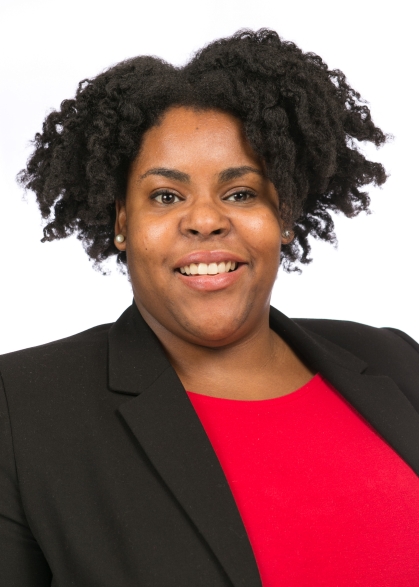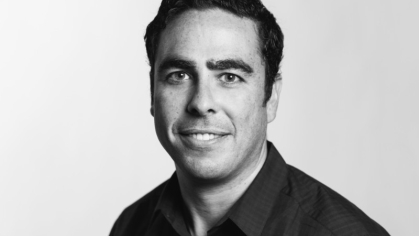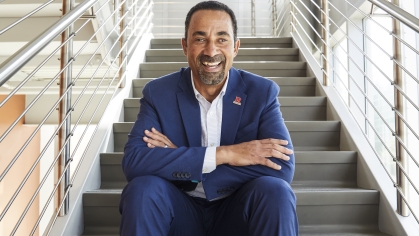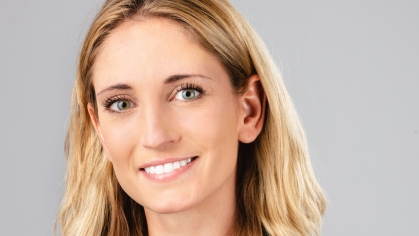
Whitney Muse earned her School of Engineering degree in applied sciences and engineering, while minoring in Spanish and political science. She went on to receive her M.A. degree in international relations and international economics with concentrations in Latin American studies and energy, resources, and the environment from the Johns Hopkins University Paul H. Nitze School of Advanced International Studies. She was recently appointed chief of staff in the Office of Electricity at the U.S. Department of Energy, where she will be focusing on the challenges and opportunities facing the nation’s power grid. Prior to this, as a manager in Deloitte’s federal energy practice, she conducted policy and regulatory analyses of domestic and international power sector projects. Earlier, she had implemented capacity-building programs for international energy regulators at the National Association of Regulatory Utility Commissioners.
Where did you grow up?
I was born in Camden, New Jersey and grew up in North Philadelphia.
Why engineering?
Engineering school taught me to learn how to learn. If you can make it through the School of Engineering, everything else is manageable.
–Whitney Muse
I was really good at school and had opportunities for a number of engineering-related summer programs that opened my eyes to the field. In middle school, I did a summer program on the Rutgers campus where we got to play with microprocessors and basic programming.
What was your engineering major?
I started out as an electrical engineer and switched to applied sciences and engineering as I looked to merge engineering and public policy. I’d interned at Lockheed Martin, but I wasn’t sure about doing this for the rest of my life. When in high school, my two big interests were engineering and international relations.
At Rutgers, I wondered what other opportunities there were and how I could combine things. Douglass College dean Carmen Ambar had a degree in public affairs from Princeton’s Woodrow Wilson School of Public and International Affairs. I asked her what they looked for to get a degree in international policy. I changed my major so I could apply engineering in the public policy space and added minors in political science and Spanish.
How did you continue to combine your dual interests in engineering and international relations?
Dean Ambar brought top international relations people to a graduate school information forum at Rutgers that was eye-opening for me. It was my first time to dive into those degrees and programs. Hopkins, where I eventually went, was there.
Did you go straight to graduate school?
No, I worked for a defense contractor, managed a local judicial election, and taught high school math for two years. It was an eclectic path to graduate school. I didn’t have a job when I graduated and wasn’t sure what my fit was. I came from a family of teachers – and eventually made my way to teaching for a while.
What do you most value about your Rutgers engineering education?
Two things. One is the co-curricular engagement I had. Serving as an executive board member of the Minority Engineering Educational Task (MEET), the Rutgers National Society of Black Engineers (NSBE) chapter, was a real touchstone for me. Coming from out of state, this was a second home and surrogate family.
Second, engineering is very much about analysis, critical thinking, and being able to problem solve. Fundamentally, much of what I do now is problem solving. Engineering gave me ways of approaching problems by analyzing the information you have and asking questions to move you forward – so you can find solutions that are economically feasible within the bounds of the resources you have.
Do you have any advice for today’s engineering students?
It is really easy coming out of K-12 to think that you have to know everything. But that’s not true at all. You can take what you’ve learned – even if you learned what you don’t want to do – and can apply it in many different places. Engineering school taught me to learn how to learn. If you can make it through SoE everything else is manageable.
How did your appointment to the Department of Energy come about?
I have been working on policy and regulatory programs related to the power sector, since I was in graduate school at Johns Hopkins. I got an invitation to apply for roles in the Biden-Harris transition team and submitted my resume.
I said I would love to work in climate change and energy-related areas. I had the experience they were looking for in dealing with energy regulator and dealing with policy. I did well in a rigorous interview and that carried the day.
What specific skills or experiences do you think are most applicable to this role?
The electrical engineering courses I took and my many co-curricular experiences I had, including studying abroad at the Universitat de València in Spain and serving on the MEET/NSBE executive board were all helpful preparation for this role, as was my graduate degree in international energy and environmental policy.
The mission of this office is to provide the nation with energy that is secure, resilient, and reliable – so we can avoid the power failures that recently happened in Texas.
We deal with issues related to the nation’s power grid. Hot topics include increasing the deployment of transmission and energy storage and improving the resilience and security of the grid.
Right now, we’re supporting Secretary of Energy Jennifer Granholm and President Joe Biden’s vision to move the nation to a clean energy future by improving our energy delivery systems and storage systems. A big part of our goals is to increase clean energy deployment or transmission.
What most excites you about your new role?
I’m excited to be getting to play a part in the big, audacious goals of the Biden administration that are responding to climate issues and that will move the country onto a better path forward.
How do you hope to help the DOE and the Biden administration meet the goal of achieving net-zero carbon emissions by 2050?
I think it takes incredible work, collaboration, funding, and deployment. And with everybody working towards that goal it is possible. Given the impact of climate change we have to do this: we’re living it. This is the coolest summer for the rest of your life because of the impact of climate change. There is no room for failing to meet this goal. We need to go all out as fast as we can to meet this goal.
How can the rest of us do our part to help?
This is a big thing and it demands big structural and systemic changes that need to be made by individual communities with all working towards this goal. You can talk about it with family and friends and with people you work with and vote for. Be conscious of the choices you are making – and the need for community engagement driving towards this goal.
What did you like to do for fun when you were a student?
I liked exploring the breadth of what Rutgers University offered. I’d hang out with friends and go to campus parties. RU women’s basketball was a favorite sport to watch. The team made the Final 4 when I was there and I got to go to that. I was in Ohio for an NSBE conference and had a friend on the team who was able to get me a ticket for the game.
What do you do for fun these days?
I love the water. One nice thing about the pandemic was that I could relocate and work anywhere, so I moved to south Florida for a while. I like to scuba dive – and am a certified scuba diver. Now, I’ve taken up kayaking on the Potomac River. I also love to spend time with friends and family again, and catch up on the last year.
Where would you go if you could take a vacation tomorrow?
I love the beach, and I’m always up for a beach vacation especially when there are opportunities to dive.


